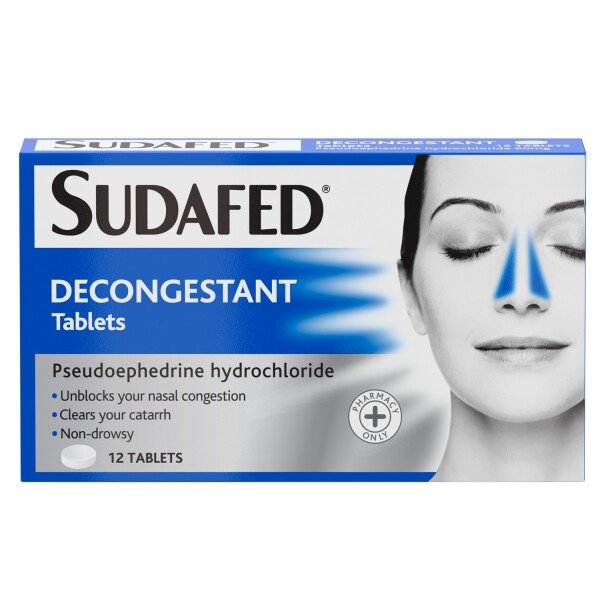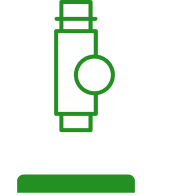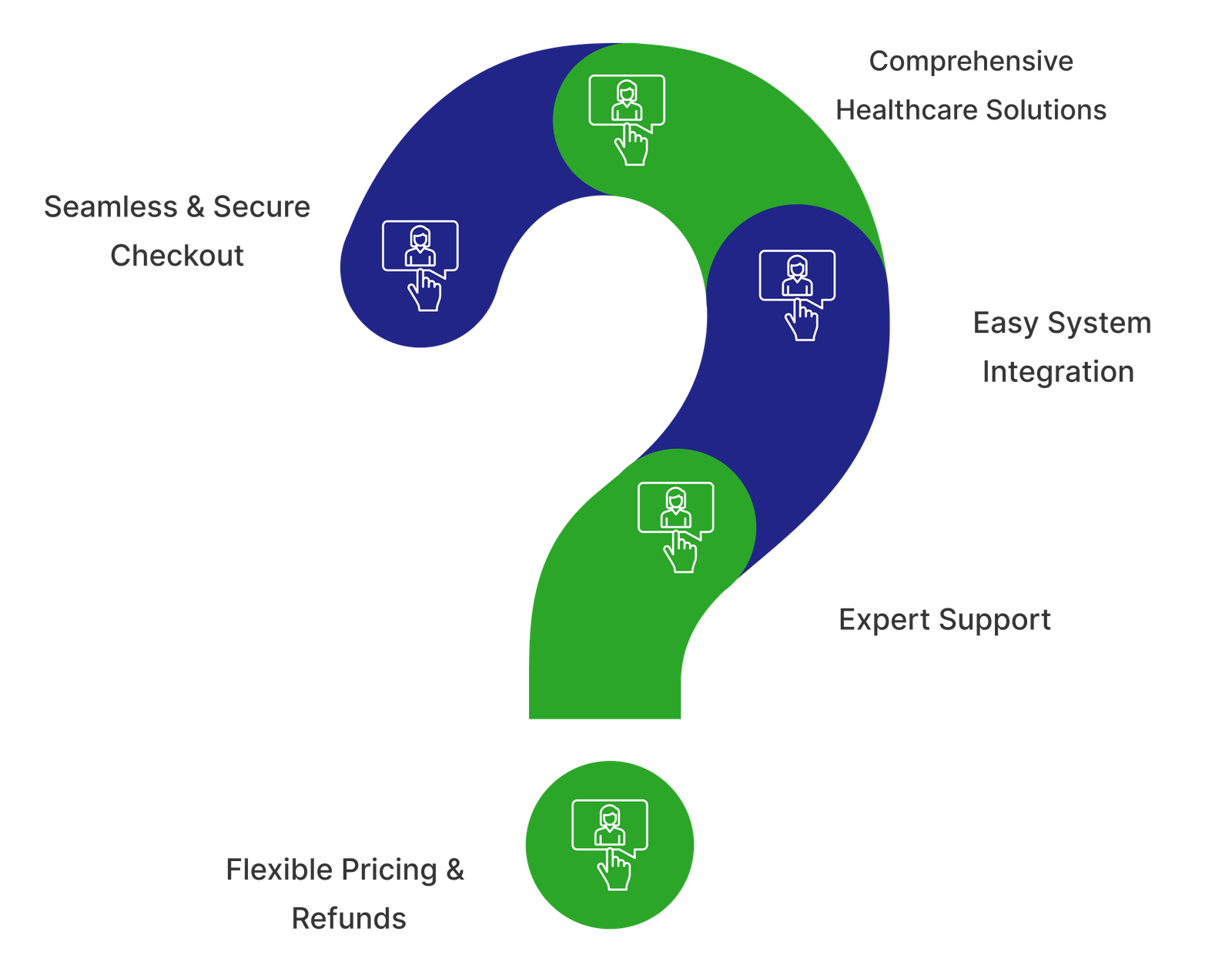

How do Sudafed Decongestant Tablets help?
Sudafed Decongestant Tablets with Pseudoephedrine hydrochloride, helps clear stuffy noses, catarrh, blocked sinuses and sinus pressure associated with colds, flu and allergies.
Do not use this medicine… If you have ever had a bad reaction to any of the ingredients of this medicine .¦ If you have high blood pressure or heart disease. ¦ If you have diabetes. ¦ If you have a phaeochromocytoma (rare tumour that affects your heart rate and blood pressure). ¦ If you have an overactive thyroid gland. ¦ If you have glaucoma (increased pressure in the eye). ¦ If you have severe kidney problems. ¦ If you are taking beta blockers (used to treat high blood pressure). ¦ If you are taking, or have taken in the last two weeks, drugs for depression known as Monoamine Oxidase Inhibitors (MAOIs) or Reversible Inhibitors of Monoamine Oxidase (RIMAs). ¦ If you are taking stimulants or appetite suppressants or drugs used to treat congestion and asthma (Sympathomimetic drugs). ¦ If you are taking any other cough and cold medicine.
¦ For children under 12 years old. If any of these apply to you, get advice from a doctor or pharmacist without using Sudafed Decongestant Tablets
Talk to your doctor or pharmacist… ¦ If you have kidney or severe liver problems. ¦ If you have blocked arteries or veins (occlusive vascular disease). ¦ If you are being treated for a thyroid disorder. ¦ If you have prostate problems (difficulty with passing water or needing to pass water often). ¦ If you are taking any other medicines, including: ¦ Antihypertensives (drugs used to treat high blood pressure such as guanethidine, methyldopa, adrenergic neurone blockers and beta blockers, debrisoquine, bretylium and betanidine). ¦ Tricyclic antidepressants (used to treat mood disorders). ¦ Anticholinergic drugs (drugs used to treat cramps or spasms) ¦ Moclobemide (used to treat mood disorders). ¦ Cardiac glycosides (drugs used to control heart rhythms or contractions such as digoxin) Ergot alkaloids (drugs used to treat migraine such as ergotamine and methysergide). ¦ Oxytocin (drug used to help contractions during childbirth). If you are not sure about any of the medicines you are taking, show the bottle or pack to your pharmacist. If any of these bullet points apply to you now or in the past, talk to a doctor or pharmacist. ¦ A feverish generalised erythema associated with pustules (see section 4) ¦ Sudden severe headaches, nausea, vomiting, confusion, fits, visual disturbances. ¦ Sudden abdominal pain or rectal bleeding may occur with this medicine, due to inflammation of the colon (ischaemic colitis). If you develop these gastro-intestinal symptoms, stop taking this medicine and contact your doctor or seek medical attention immediately. See section 4. ¦ Reduction of blood flow to your optic nerve may occur with this medicine. If you develop sudden loss of vision, stop taking this medicine and contact your doctor or seek medical attention immediately.
If you are pregnant or breast-feeding If you are pregnant, or breast-feeding, think you may be pregnant or are planning to have a baby, ask your doctor or pharmacist for advice before taking this medicine. Some of the ingredients can cause problems
This medicine contains lactose. If you have been told by your doctor that you have an intolerance to some sugars, contact your doctor before taking this medicine.
Like all medicines, Sudafed Decongestant Tablets can have side-effects, although not everybody gets them. If you experience any of the following, stop using the medicine and seek immediate medical help: ¦ Sudden onset of fever, reddening of the skin, or many small pustules (possible symptoms of Acute Generalized Exanthematous Pustulosis - AGEP) may occur within the first 2 days of treatment with this medicine . ¦ Severe headache, nausea, vomiting, confusion, fits, visual disturbances. ¦ Swelling of the face, lips, mouth, tongue or throat which may cause difficulty in swallowing or breathing. ¦ Allergic reactions including skin rashes such as hives (which may be severe and include blistering and peeling of the skin) and itching. ¦ Hallucinations or paranoid delusions. ¦ Inflammation of the colon due to insufficient blood supply (ischaemic colitis).
Symptoms may include sudden abdominal pain or rectal bleeding. If you experience any of the following, stop using the medicine and talk to your doctor Restlessness or sleep disturbances. ¦ A fast or irregular heartbeat or an increased awareness of the heartbeat (palpitations). ¦ Trouble passing water (especially in men with prostate problems).
Other effects which may occur include: Very Common (may affect more than 1 in 10 people) ¦ Headache Common (may affect up to 1 in 10 people) ¦ Difficulty sleeping, nervousness or dizziness ¦ Dry mouth or nausea Other effects which may occur but it is unknown how often: ¦ Vomiting ¦ Anxiety, irritability, feeling jittery or feelings of extreme happiness ¦ Heart attack/reduced blood flow to the heart which can cause discomfort or pain in the chest, neck, back, jaw, shoulders or arms (known as angina) ¦ Stroke ¦ Pain when passing water High blood pressure ¦ Drowsiness ¦ Reduced blood flow to the optic nerve (Ischaemic optic neuropathy)
Reporting of side-effects If you get any side-effects, talk to your doctor, pharmacist or nurse. This includes any possible side-effects not listed in this leaflet. You can also report side-effects directly via the Yellow Card Scheme at www.mhra.gov.uk/yellowcard or search for MHRA Yellow Card in the Google Play or Apple App Store. By reporting side-effects you can help provide more information on the safety of this medicine.
Always read the label
Talk to your doctor or pharmacist… ¦ If you have kidney or severe liver problems. ¦ If you have blocked arteries or veins (occlusive vascular disease). ¦ If you are being treated for a thyroid disorder. ¦ If you have prostate problems (difficulty with passing water or needing to pass water often). ¦ If you are taking any other medicines, including: ¦ Antihypertensives (drugs used to treat high blood pressure such as guanethidine, methyldopa, adrenergic neurone blockers and beta blockers, debrisoquine, bretylium and betanidine). ¦ Tricyclic antidepressants (used to treat mood disorders). ¦ Anticholinergic drugs (drugs used to treat cramps or spasms) ¦ Moclobemide (used to treat mood disorders). ¦ Cardiac glycosides (drugs used to control heart rhythms or contractions such as digoxin)
Adults and children aged 12 years and over Swallow 1 tablet every 4-6 hours up to 4 times a day
Leave at least 4 hours between doses. ¦ Do not take more than 4 doses in 24 hours. ¦ If symptoms persist or worsen talk to your doctor
If anyone has too much If anyone has too much contact a doctor or your nearest Accident & Emergency Department (Casualty) taking this leaflet and pack with you. If you forget to take the medicine
If you forget to take a dose, take the next dose when needed provided that the last dose was taken at least 4 hours ago. Do not take a double dose.
¦ For oral use only. ¦ Do not take more medicine than the label tells you to. ¦ Take with a glass of water. Children under 12 years Do not give to children under 12 years old.
Common Side Effects:
Anxiety or restlessness
Insomnia
Headache
Tremor
Dry mouth
Nausea
Serious Side Effects:
High blood pressure
Increased heart rate
Confusion or agitation
Hallucinations
Abuse or misuse
Short-Term Use Only: Limit use to a maximum of 3 days. Prolonged use may lead to dependence and withdrawal symptoms .
Children Under 12 Years: Not recommended due to the risk of opioid toxicity from variable metabolism of codeine .
Liver and Kidney Impairment: Use with caution; dosage adjustments may be necessary .
Alcohol and CNS Depressants: Avoid concurrent use as it may increase the risk of respiratory depression and sedation .
Your Trusted Healthcare Partner

Unlock insights for improved patient outcomes.

Optimize healthcare processes with precise forecasting.

Leverage intelligent solutions for enhanced decision-making.

Streamline workflows for better patient engagement.


Browse our test catalog and choose the tests you require. If you're unsure, our healthcare providers are available to guide you.
Schedule your test online or via our customer support. Opt for home sample collection or visit our nearest collection center at your convenience.
Our trained personnel will collect your sample, ensuring minimal discomfort and adherence to safety protocols.
Your sample is processed in our advanced laboratory, where accuracy and speed are paramount.
Once ready, you'll receive a notification to access your reports online.

Your Questions Answered, Your Care Simplified

Simply sign in to your account, choose a medical specialist, and schedule an appointment at a time that suits you.
Yes, all specialists on our platform are highly qualified and certified to provide expert care in their respective fields.
Absolutely. We use advanced encryption and security measures to ensure that your personal and medical data are protected at all times.
Yes, your consultation records, treatment plans, and prescriptions are securely stored and easily accessible 24/7 through your account